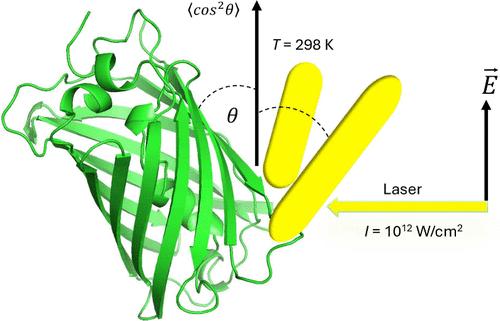Laser-Induced Alignment of Nanoparticles and Macromolecules for Coherent-Diffractive-Imaging Applications
IF 15.6
1区 化学
Q1 CHEMISTRY, MULTIDISCIPLINARY
引用次数: 0
Abstract
Laser-induced alignment of particles and molecules was long envisioned to support three-dimensional structure determination using “single-molecule diffraction” with X-ray free-electron lasers [PRL 92, 198102 (2004)]. However, the alignment of isolated macromolecules has not yet been demonstrated also because quantitative modeling is very expensive. We computationally demonstrated that the alignment of nanorods and proteins is possible with a standard laser technology. We performed a comprehensive analysis on the dependence of the degree of alignment on molecular properties and experimental details, e.g., particle temperature and laser-pulse energy. Considering the polarizability anisotropy of about 150,000 proteins, our analysis revealed that most of these proteins can be aligned using realistic experimental parameters.

激光诱导纳米粒子和大分子对准在相干衍射成像中的应用
长期以来,人们一直设想激光诱导粒子和分子的排列,以支持使用x射线自由电子激光的“单分子衍射”来确定三维结构[PRL 92, 198102(2004)]。然而,由于定量建模非常昂贵,分离大分子的排列尚未得到证实。我们通过计算证明,纳米棒和蛋白质的排列是可能的标准激光技术。我们对分子性质和实验细节(如粒子温度和激光脉冲能量)对取向程度的依赖性进行了全面分析。考虑到大约150,000种蛋白质的极化各向异性,我们的分析表明,大多数这些蛋白质可以使用现实的实验参数对齐。
本文章由计算机程序翻译,如有差异,请以英文原文为准。
求助全文
约1分钟内获得全文
求助全文
来源期刊
CiteScore
24.40
自引率
6.00%
发文量
2398
审稿时长
1.6 months
期刊介绍:
The flagship journal of the American Chemical Society, known as the Journal of the American Chemical Society (JACS), has been a prestigious publication since its establishment in 1879. It holds a preeminent position in the field of chemistry and related interdisciplinary sciences. JACS is committed to disseminating cutting-edge research papers, covering a wide range of topics, and encompasses approximately 19,000 pages of Articles, Communications, and Perspectives annually. With a weekly publication frequency, JACS plays a vital role in advancing the field of chemistry by providing essential research.

 求助内容:
求助内容: 应助结果提醒方式:
应助结果提醒方式:


